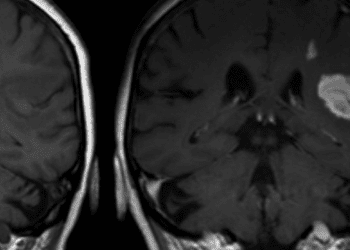Cardio-oncology rehabilitation for cancer survivors promotes improvements in cardiorespiratory fitness — the CORE trial
1. The CORE trial showed that a cardio-oncology rehabilitation program demonstrated clinically significant enhancements in peak oxygen consumption in cancer survivors at significant cardiovascular risk when compared to community-based exercise training (CBET).
2. The center-based cardiac rehabilitation (CBCR) framework group also demonstrated superior improvements in quality of life (QOL), exercise adherence, health literacy, and cardiovascular risk factor (CVRF) control.
Evidence Rating Level: 1 (Excellent)
Study Rundown: Cancer survivors face an increased risk of non-cancer-related health problems, particularly cardiovascular diseases, due to factors like aging, cancer treatments, and cardiovascular side effects. Addressing cardiorespiratory fitness and controlling CVRFs in this population is significant. Exercise training is recommended for patients with cardiovascular diseases (CVDs), and a recent multidimensional model based on cardiac rehabilitation has been proposed for cancer patients. While physical exercise is a recognized strategy to improve cardiorespiratory fitness in cancer survivors, the effects of a comprehensive rehabilitation approach on those with previous cardiovascular disease or exposure to potentially cardiotoxic cancer treatments remain unclear. Thus, the CORE trial, a randomized clinical trial, was designed to assess the impact of a center-based cardiac rehabilitation program (CBCR) in comparison to usual care involving community-based exercise for high cardiovascular-risk cancer survivors. This study found that cancer survivors at high cardiovascular risk experienced greater improvements in their peak oxygen consumption (VO2) when participating in a cardio-oncology rehabilitation model compared to those who received standard care, which included a community-based exercise intervention. One limitation of this study is the small sample size, which reduces the strength and applicability of the findings to a wider population. In conclusion, the results highlight that combining a cardio-oncology program with cardiac rehabilitation infrastructure can optimize the benefits of exercise and lifestyle improvements for patients with complex healthcare needs, emphasizing the importance of policymakers and healthcare providers considering its incorporation into standard care with adequate coverage.
Click to read the study in JAMA Cardiology
Click to read an accompanying editorial in JAMA Cardiology
Relevant Reading: Cardiovascular Risk Factors Are Associated With Future Cancer
In-Depth [randomized controlled trial]: This study was a prospective, single-center, randomized clinical trial (CORE trial) that took place between March 1, 2022 – March 31, 2022, and had a total of 75 adult cancer survivor participants who had exposure to cardiotoxic cancer treatment and/or previous cardiovascular disease. The study had a parallel 2-arm group design to investigate whether a two-month medically supervised cardio-oncology rehabilitation program could lead to improved cardiorespiratory fitness, better control of cardiovascular risk factors, enhanced QOL, and increased health literacy in high cardiovascular-risk cancer survivors compared to standard care involving CBET. Cancer survivors in the CBCR group received comprehensive outpatient cardiac rehabilitation, including exercise sessions led by physiotherapists, dynamic resistance exercises, nutritional guidance, psychological support, and health education, with a focus on cardiovascular risk factor management, as part of their standard care regimen. Within the CBET group, participants received nutritional and psychosocial support based on their physician’s assessment and standard care, along with two weekly exercise sessions conducted by a certified exercise physiologist at a community-based facility, with training intensity matching that of the CBCR group. The main outcome was cardiorespiratory fitness, measured by the change in peak VO2 from baseline to 8 weeks using a cardiopulmonary exercise test, with secondary measurements including muscle strength, cardiovascular risk factors, inflammation markers, QOL, and health literacy, all assessed at the start and end of the 8-week intervention at the hospital facilities over two non-consecutive days.
In the CBCR group, peak VO2 increased by a mean (SD) of 2.1 (2.8) mL/kg/min (P < 0.01), whereas in the CBET group, the increase was 0.8 (2.5) mL/kg/min (P = 0.07), resulting in a significant difference of 1.3 mL/kg/min (95% CI, 0.1-2.6 mL/kg/min; P = 0.03) between the two groups. There was also a greater improvement in CVRF control with the CBCR group. Compared to the CBET group, participants in the CBCR group experienced more significant improvements in systolic (mean [SD] change, −12.3 [11.8] mm Hg vs. −1.9 [12.9] mm Hg; P < 0.001) and diastolic (mean [SD] change, −5.0 [5.7] mm Hg vs. −0.5 [7.0] mm Hg; P = 0.003) blood pressure, heart rate, body composition (weight, BMI [mean (SD) change, −1.2 (0.9) vs. 0.2 (0.7); P < 0.001), lean and fat body mass, waist and hip circumference, daily physical activity (mean [SD] increase, 1035.2 [735.7] metabolic equivalents [METs]/min/week vs. 34.1 [424.4] METs/min/week; P < 0.001), and levels of total cholesterol, triglycerides, and low-density lipoprotein cholesterol. There were also superior results in QOL, health literacy, and exercise adherence.
Image: PD
©2023 2 Minute Medicine, Inc. All rights reserved. No works may be reproduced without expressed written consent from 2 Minute Medicine, Inc. Inquire about licensing here. No article should be construed as medical advice and is not intended as such by the authors or by 2 Minute Medicine, Inc.

![2MM: AI Roundup- AI Cancer Test, Smarter Hospitals, Faster Drug Discovery, and Mental Health Tech [May 2nd, 2025]](https://www.2minutemedicine.com/wp-content/uploads/2025/05/Untitled-design-350x250.png)





